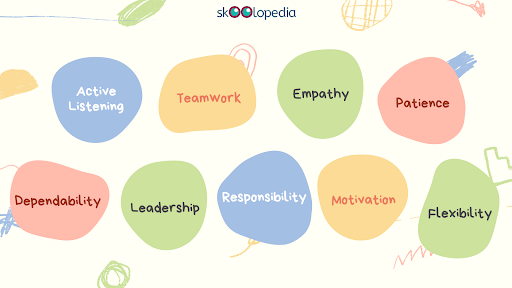Important Skills Your Kids Need … Not Found in Textbooks
School is very important, there is no doubt about that – it’s the first stepping stone in life for a child. In school, textbooks teach multiplication tables and the alphabet, all very beneficial for the development of a student’s academic life. But, is textbook knowledge on its own enough for your child to be ready for life?
The answer is no. Though your child may thrive during their schooling years based on just textbook knowledge (also known as technical skills), they will eventually find themselves lost without essential soft skills to help them navigate through social settings. Some may even lack the skills to take care of themselves, as they struggle to adapt to the independent work life.
Take for example a fresh graduate who has loaded his/her resume with technical, textbook learnt skills. True, they may get noticed by organisations while on their job hunt, but they eventually lose out to other hires who have useful soft skills on top of their technical skills.
You may be thinking that it may be too early to introduce soft skill training to your kid, however, a study done by MIT showed that it takes at least 8-months for soft skills to be learned and used effectively. And, since soft skills are behavioural, they can be improved over time – to sum it up, it’s never too early to pick up on these skills.
Now that you know that soft skill development is important for your child’s future, you may also be wondering…
What soft skills are important to learn & develop?
01. Critical Thinking – one of the most valuable cognitive skills which enables us to respond to problems logically and with discipline. Critical thinking is vital to a child’s cognitive and brain development.
To develop critical thinking, constant exposure to problem solving opportunities are important: provide open-ended questions as you communicate with your little one, and allow them to experiment and formulate solutions. Make sure to give your child time to think and reflect on their responses, and allow them to correct themselves. Guide them with hypothetical questions if they’re stuck, but don’t give them the answer immediately!
02. Having good Time Management is also incredibly vital. For children, time management is important for student life where they will have to become independent and handle tasks at their own time. By practising good time management, children have the potential to be goal oriented, strategic in planning, and can manage their own time limits.
Here are a few ways to teach your child effective time management:
 03. To ensure that your child is ready for social settings, having well-rounded and good social skills – also known as Interpersonal Communication skills, are essential for their growth.
03. To ensure that your child is ready for social settings, having well-rounded and good social skills – also known as Interpersonal Communication skills, are essential for their growth.
How a parent interacts with their child will give them ideas on how to socialise, so lead by example and be mindful of what you say, and how you behave towards others around them. Try to enforce exemplary behaviour around them; such as leadership, active listening & empathy!
 04. Emotional Intelligence, also known as emotional quotient/EQ, is the ability to understand, use, and manage one’s own emotions in a positive way in order to empathise with others, defuse conflicts, and most importantly to regulate one’s own stress levels. Having good emotional intelligence is incredibly important for our personal & professional relationships.
04. Emotional Intelligence, also known as emotional quotient/EQ, is the ability to understand, use, and manage one’s own emotions in a positive way in order to empathise with others, defuse conflicts, and most importantly to regulate one’s own stress levels. Having good emotional intelligence is incredibly important for our personal & professional relationships.
Similarly to interpersonal communication, be sure to always set an example for your child by displaying empathy, proper conflict resolution, and also expose them to new social settings!
05. For children, Adapting means learning how to react to new information, and how to move from one task to another easily – in short, this is an important functional skill which lays the groundwork for teamwork and problem solving.
Parents can introduce play dates with other children and interactive “role-play” games which require imagination, to stimulate cooperation and creative thinking.
06. Self-care assists youths in developing more awareness of their emotional and physical needs. Additionally, it can help them to deal with stressors in the future. Stress can also be reduced, relationships can be strengthened, and physical and mental wellness can be promoted by even little acts of self-care and self-help.
It’s very important to teach your children self care. You can do so by taking the following steps:
 Now that you know which soft skills are important, and have new ideas on how to help your little one develop them, make sure to get a head start and enforce these good behavioural habits and skills today!
Now that you know which soft skills are important, and have new ideas on how to help your little one develop them, make sure to get a head start and enforce these good behavioural habits and skills today!






Give your Opinions